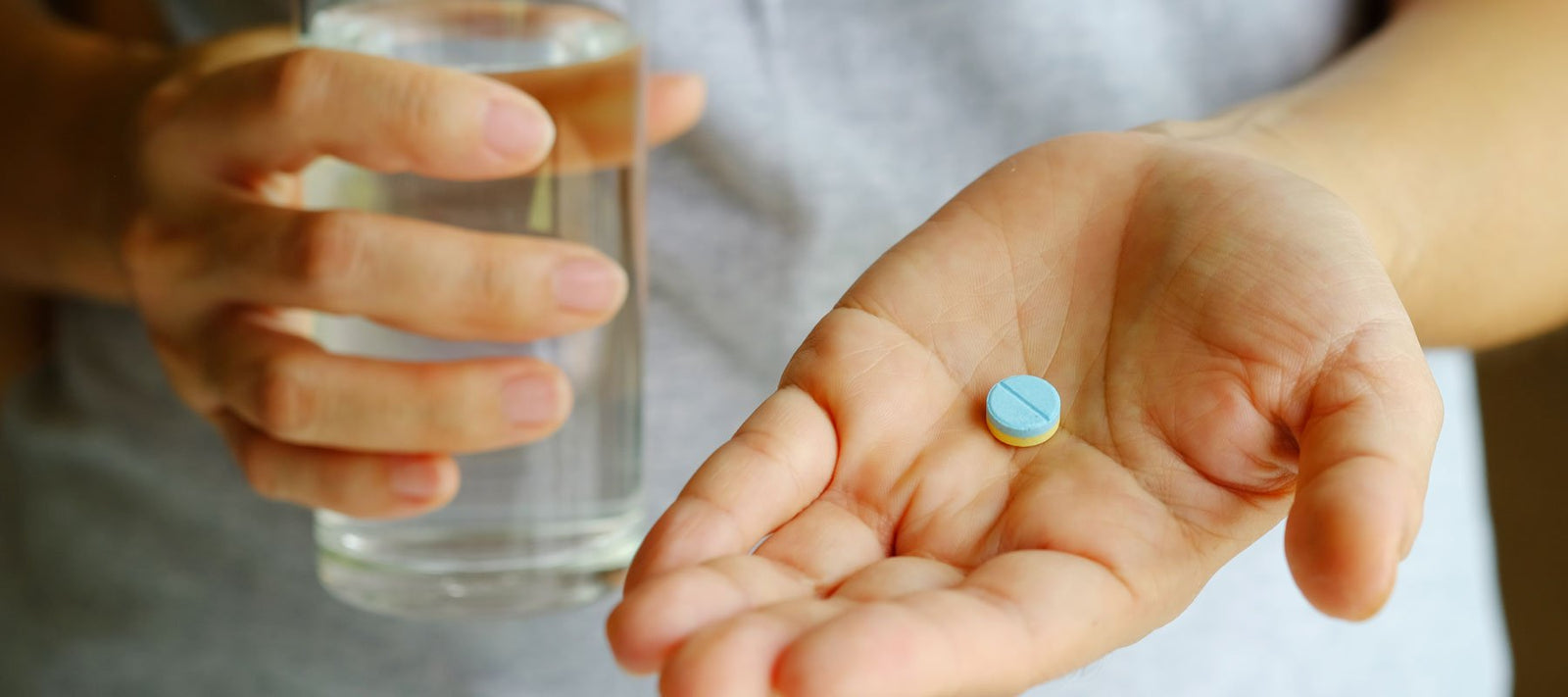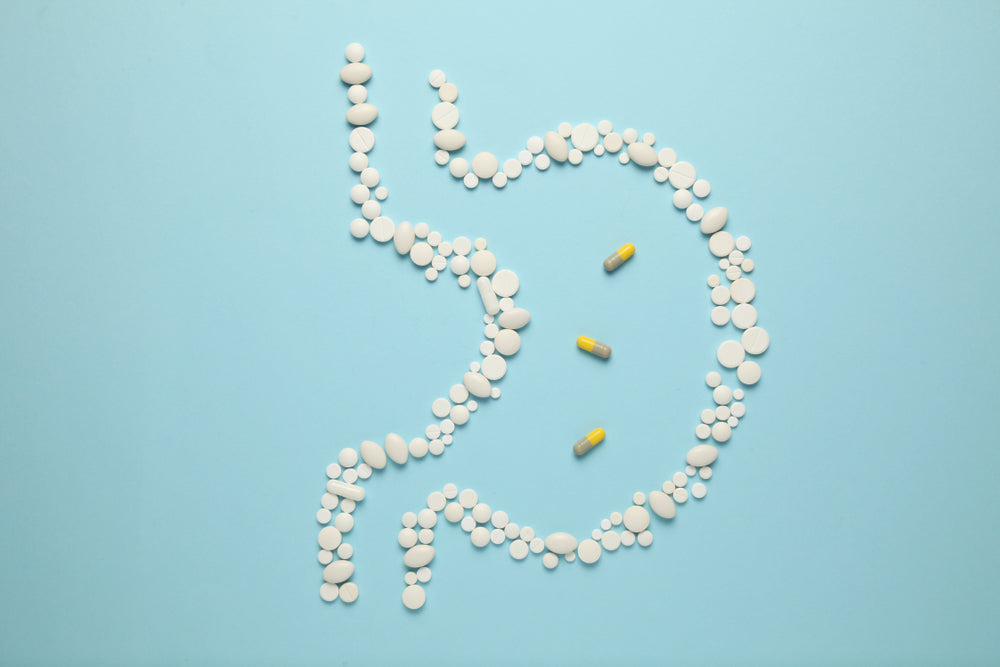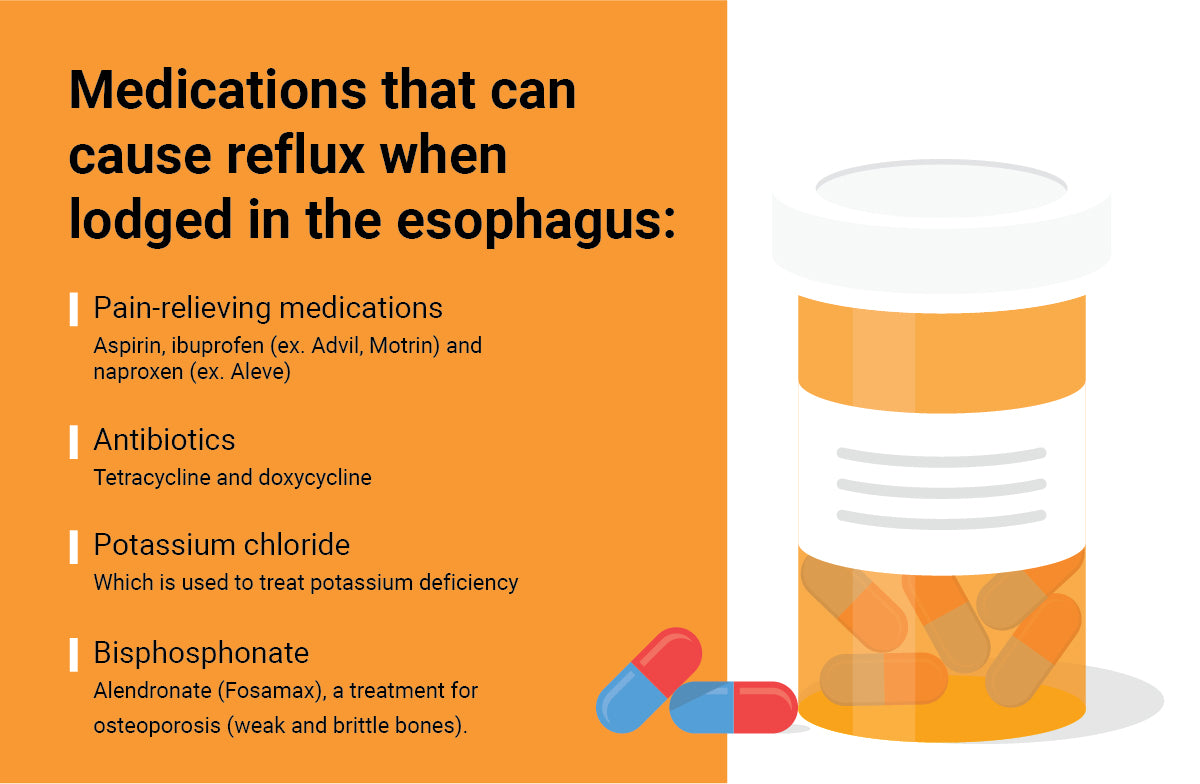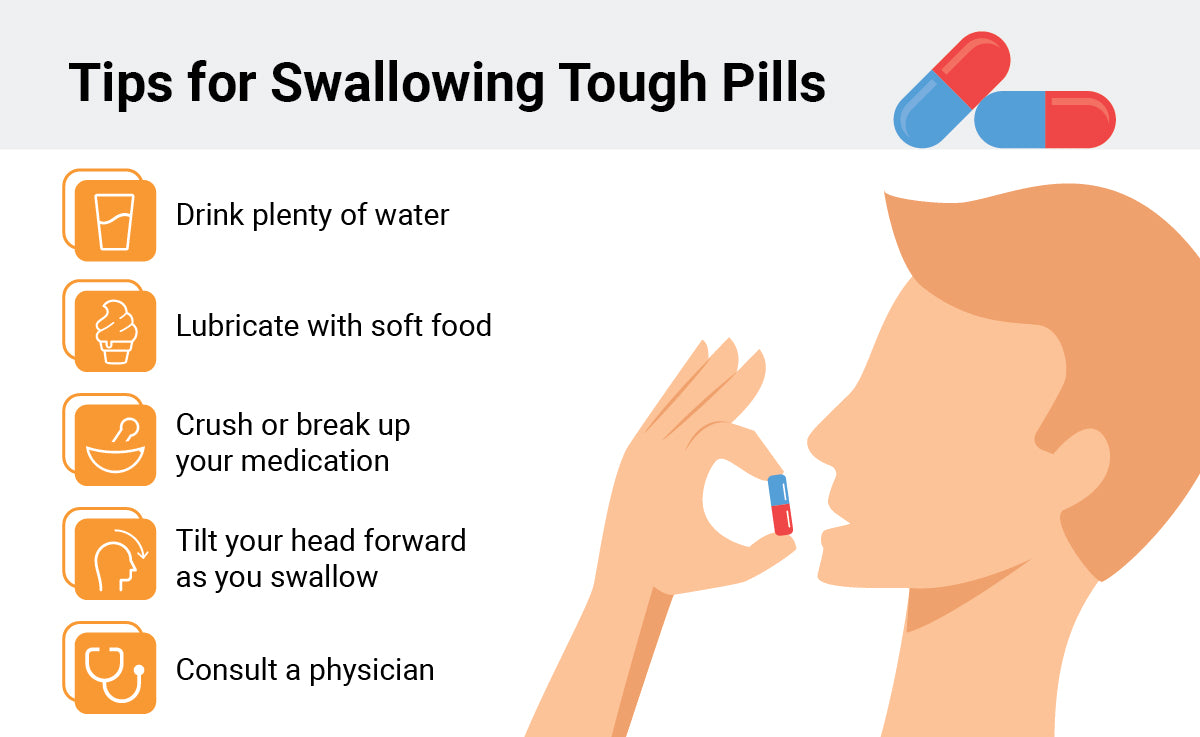Your Cart is Empty
Get €20 Off by subscribing to newsletter!
MedCline Gift card : offer from 50€ to 300€!
Get €20 Off by subscribing to newsletter!
MedCline Gift card : offer from 50€ to 300€!

Medications That Cause Acid Reflux Symptoms When Stuck in Throat
One of the first steps in treating acid reflux/GERD (Gastroesophageal Reflux Disease) is to know what’s triggering your symptoms. Food triggers vary but certain foods, such as tomatoes and onions, and beverages, like coffee and alcohol, are commonly known to trigger symptoms.
But another possible trigger may also be lurking in your medicine cabinet. While non-chewable pills are meant to pass through your esophagus into your stomach or intestines before dissolving, sometimes these pills can get caught in your esophagus and cause acid reflux flare-ups.
If you’ve ever felt that pill stuck in throat burning sensation, read on to learn about which medications could be irritating your acid reflux and what you can do to minimize your symptoms. Use the links below to skip to the section that best answers your query, or read through for a comprehensive overview of the topic.
- What Happens When a Pill Gets Stuck in Your Throat?
- Which Pills Can Cause Acid Reflux Symptoms?
- How to Avoid Getting a Pill Stuck in Your Throat
- Other Tips for Managing Acid Reflux
- MedCline Acid Reflux Relief Systems
What Happens When a Pill Gets Stuck in Your Throat?
When a pill is stuck in your throat, it can break down and release the medication causing damage to your esophagus. Tablets can also get lodged in the Lower Esophageal Sphincter (LES), a small valve right above your stomach. In both cases, these medications can cause reflux symptoms when not properly ingested.
Over time, repeated esophageal exposure to medications can lead to GERD, esophagitis, and other serious diseases. In some cases, the harmful effects are worse than the ailment that prompted the medication.
Why do pills get stuck?
When you swallow food, water, or your medication, the particles have to travel down through your esophagus and eventually land in your stomach, but sometimes, objects, like pills, get stuck at the top of the esophagus. At the top of your esophagus, there’s a ring-like muscle called the cricopharyngeus5, which helps control which objects can pass through. If the cricopharyngeus does not relax as you swallow, your pill might get stuck.
To avoid that uncomfortable pill stuck in your throat feeling, and resulting reflux symptoms, you’ll want to ensure that your medication passes through your throat as smoothly as possible. We’ll discuss some pill swallowing techniques to help you avoid inducing reflux a little later on in this post.

Which Pills Can Cause Acid Reflux Symptoms?
Dull, aching pain in the chest or shoulder after taking medication is a warning sign that a pill may be lodged in your esophagus. Having a pill stuck in your throat is uncomfortable as is, but certain medications manifest more irritating effects, such as acid reflux, when they break down in your esophagus.

The types of drugs that can cause reflux and other problems when lodged in the esophagus include:
- Pain-relieving medications: Including aspirin, ibuprofen (ex. Advil, Motrin) and naproxen (ex. Aleve)
- Antibiotics: Including tetracycline and doxycycline
- Potassium chloride: Used to treat potassium deficiency
- Bisphosphonates: Including alendronate (Fosamax), a treatment for osteoporosis (weak and brittle bones).
What to do if medication causes acid reflux symptoms
While food-related triggers can be avoided, taking medication may be essential to treat a disease, relieve pain, or fight off an infection. It is important to understand how to reduce the risks of drug-induced GERD and other esophageal damage.
If your medication is causing acid reflux symptoms, talk to your doctor to see if there are any alternative treatment methods you can employ. Additionally, whether you’re taking acid reflux medication, aspirin, ibuprofen, or some other irritating medicine, it’s important to make sure that you’re following proper precautions when administering your medication. To help you minimize the potential for acid reflux irritation when taking your medication, we’ve outlined some tips below.

How to Avoid Getting a Pill Stuck in Your Throat
When a pill gets stuck in your throat, it deteriorates and releases the medication over time, potentially causing reflux flare-ups and ultimately, damage to your esophagus. To avoid this scenario or getting a pill stuck in your windpipe, it’s important to take precautions when consuming any medication orally.
Here are some tips6 to help a capsule pass through the esophagus quickly and into the stomach:
- Take several sips of water to wet the throat before taking a tablet or capsule.
- Swallow the pill with at least 8 ounces of fluid.
- Lubricate With Soft Food
- Ex. applesauce and yogurt
- Crush or Break Up the Pill
- Taking the medication in smaller segments can make it easier to swallow; just consult your doctor before doing so.
- Adjust Your Position
- Take medication while in an upright or sitting position.
- Stay upright for at least fifteen minutes after taking a pill.
- Consult Your Physician
- If these tips don’t work, your doctor may be able to recommend a medication that’s easier to swallow.

In addition to following the above best practices, be sure to avoid these common mistakes when taking medication:
- Not drinking enough water after swallowing a pill
- Taking medication while lying down
- Lying down immediately afterward
- Taking medication just before going to bed
Note: If swallowing is painful or if the tablets or capsules get stuck in your throat, you should contact your doctor. Trouble swallowing could signal a more serious condition.
While medication can be an important part of managing disease, it can also trigger acid reflux and lead to GERD and other conditions. By taking your pills with care, you can limit your risk of drug-induced complications from obstruction of the esophagus. And, when possible, supplement or replace medications with preventative treatments that don’t have unwanted side effects (always consult with your doctor first before changing a drug regimen).
What should I do if a pill gets stuck in my throat?
When a pill gets stuck in your throat, it can cause damage to your esophagus, including inflammation, acid reflux flare-ups, and potentially pill-induced esophagitis7. With that said, if a pill gets stuck in your throat, you should never leave it to dissolve, but rather wash it down with food or water. You can also try lying down as you swallow the water to encourage your throat to relax and dislodge the pill.
Other Tips for Managing Acid Reflux
In addition to abiding by these recommended pill-ingesting techniques, keep these tips for managing acid reflux in mind:
- Avoid your trigger foods: Citrus fruits, tomato-based products, as well as fried and spicy foods are common culprits of reflux flare-ups.
- Integrate GERD-friendly foods into your diet:High-fiber, alkaline-rich, and watery foods such as cucumber and watermelon are known to prevent acid reflux symptoms.
- Change up your mealtime habits: Try to eat smaller meals throughout the day and avoid eating right before bedtime to prevent nighttime reflux.
- Adjust your sleeping posture:By sleeping at an incline, or better yet, on your left side and at an incline, you can minimize uncomfortable reflux symptoms while you sleep.
Keep these best practices and use our tips to prevent pills from getting stuck in your throat, and you’ll find the relief you’ve been searching for in no time.
MedCline Acid Reflux Relief Systems
Some of our customers have offered feedback, including comments about their personal experience with reducing or eliminating the need for acid reflux medications when using the MedCline Reflux Relief System. We hope to continue to help others find acid reflux relief outside of the medicine cabinet.
Our patented three-component Reflux Relief Sleep System is the only product on the market today that achieves the doctor-recommended inclined, left-side sleeping position in one simple solution for effective, natural acid reflux symptom relief.
Clinical studies show significant improvement for:
- Gastroesophageal Reflux Disease (GERD) // Acid Reflux
- Laryngopharyngeal Reflux (LPR) // Silent Reflux
- Gestational Reflux
References:



